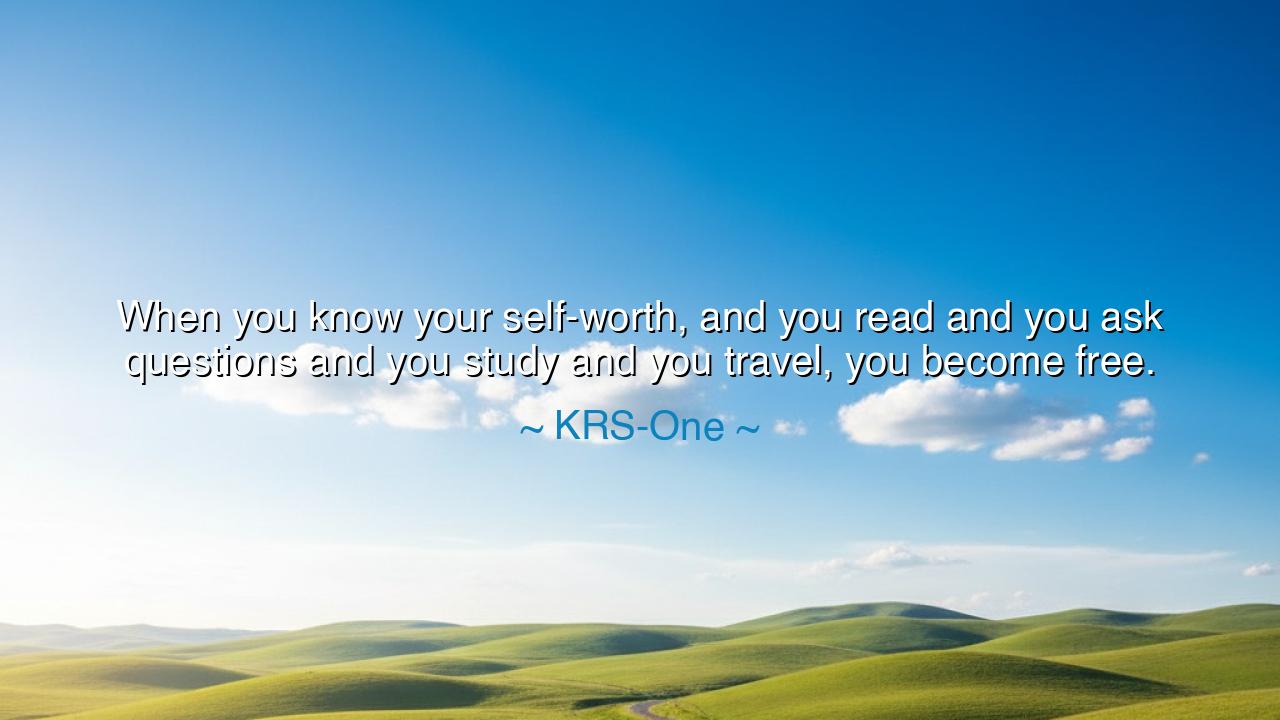
When you know your self-worth, and you read and you ask
When you know your self-worth, and you read and you ask questions and you study and you travel, you become free.






KRS-One, master of words and teacher of minds, once spoke a truth that resonates across ages: “When you know your self-worth, and you read and you ask questions and you study and you travel, you become free.” These are not idle words, but the map of liberation itself. For what are chains, if not ignorance of one’s value? And what is freedom, if not the awakening of the mind and spirit to the fullness of its power?
When he speaks of self-worth, he names the cornerstone of freedom. For no man who despises himself can ever be free, even if no prison walls surround him. The slave who believes he is unworthy remains bound; the poor man who thinks he is nothing remains in despair. But the one who sees his own dignity, who knows he was born with purpose and power—this one cannot be truly enslaved. The ancients knew this: Socrates, when condemned to death, stood unbroken, because he knew the worth of his soul could not be touched by chains or poison.
Then comes the call to read, to ask questions, to study. These are the tools of the seeker. Knowledge is the sword that cuts through lies, the lamp that drives out darkness. A man who does not read is blind, though his eyes are open. A man who does not ask questions walks in circles, though his feet may move forward. To read is to commune with the minds of the past; to ask questions is to demand truth from the present; to study is to prepare wisdom for the future. Each is a step in the path toward liberation.
But KRS-One does not stop there. He calls also to travel. For travel is the test of knowledge, the living classroom of the soul. The one who stays only in his village, in his city, sees the world through a narrow crack. But the one who journeys to foreign lands, who hears the tongues of strangers, who beholds poverty and majesty, temples and marketplaces, learns that truth is vast and that humanity is many yet one. Think of Herodotus, who wandered to record the customs of peoples; think of Ibn Battuta, who crossed continents to learn from every culture. They traveled, and in their travels, they became free of ignorance, free of narrowness, free of small vision.
The meaning of the quote, then, is heroic: that freedom is not given—it is built. It is forged through knowledge, through curiosity, through movement, and above all, through knowing one’s own worth. The tyrant can take your gold, can seize your land, can even silence your tongue. But he cannot strip away the freedom that comes from within, the freedom of a mind sharpened by study, a spirit strengthened by travel, and a soul rooted in its own worth.
Consider the story of Frederick Douglass, born in slavery yet liberated first by his thirst for knowledge. He taught himself to read, and through the written word, he discovered his dignity. His body was in chains, but his mind soared. Later, through escape and travel, he grew not only free himself, but became a liberator for others. His life embodies precisely what KRS-One declares: knowledge, curiosity, and self-worth break the chains of oppression.
Therefore, O seeker, let this be your path: cherish your self-worth, never doubting that you are a vessel of greatness. Feed your mind through reading, sharpen it by asking questions, strengthen it through study, and broaden it with travel. These are not luxuries—they are the very steps to freedom.
So remember the teaching of KRS-One, etched now into your heart: “When you know your self-worth, and you read and you ask questions and you study and you travel, you become free.” Let it be your guide, your shield, your anthem. For the road to freedom does not begin in the chains of the world, but in the awakening of your own soul.






AAdministratorAdministrator
Welcome, honored guests. Please leave a comment, we will respond soon